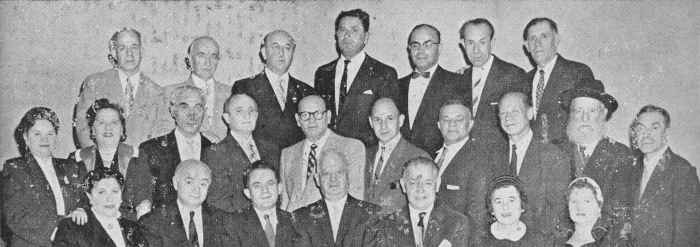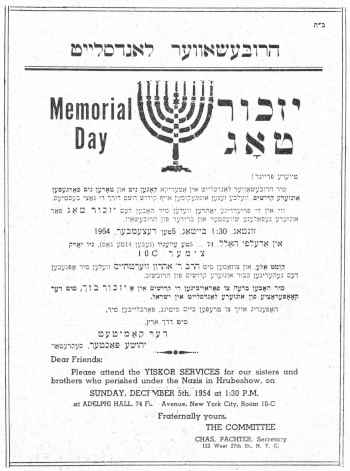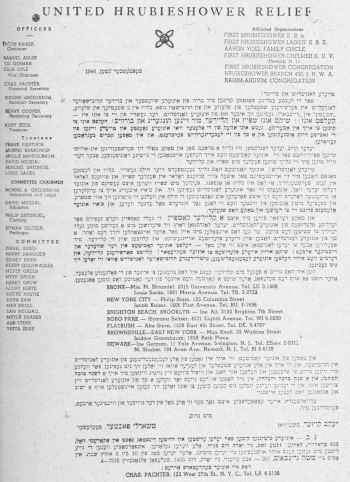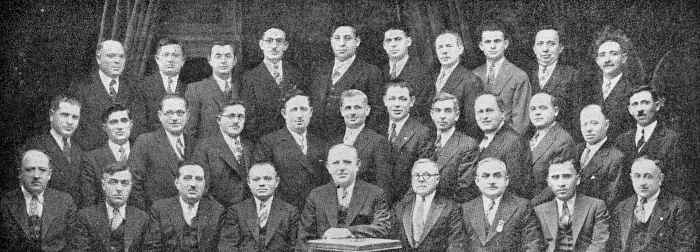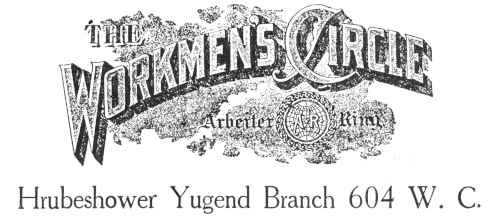[Columns 775 - 776]
Our Townspeople in the United States
by Beni Kuper, New York
Translated by Yael Chaver
|
|
Hrubieszow Yizkor Book U.S. Committee
Standing: Khayim Zeltzer, Eliyahu Eydenblat, Ya'akov Tshekhovitsh, Re'uven Kats, Eliyahu Zilberblekh. Yosef Oyl, Avrom Kam
Second row: Ya'akov Rozenblat, Yehoshua Zomer, Noyekh Kam, Moyshe Grinboym, Max Knal, Leyzer Goldberg, Itshe Shaffel, Aryeh Shnayder, Bessie Kuper, Lily Korn
Seated: Shifra Hastig, Khane Kam, Moyshe Mekhl Krakover, Beni Kuper, Yekhezkel Korn, Yehoshua Pachter, Tsine Oyl |
Some of us realized, as early as 1890, that there was no point in remaining in the town, especially as the prospects of earning a good living were minimal.
They translated their thought into action, left home, and began cultivating a new future. Among them were artisans, shopkeepers, Yeshiva students, and young husbands living at their fathers-in-law's expense.[1] All had the same view of the future. Among them were David Bobes (may he rest in peace), Itsik Merinshteyn (may he rest in peace), Henekh Zalmen Retig (may he rest in peace), Berl Hastatsher (may he rest in peace), Shperling, Yehuda Ber Korn, and Max Fayer, the Palast brothers (now living in Chicago), and others.
In 1905, the small cluster of Hrubieszow natives founded the first Hrubieszow organization to support the sick.
In later years, people left Hrubieszow because of political or military reasons.[2] By 1910, there were about 200 families. In 1912, observant people established a society and a synagogue. Some Hrubieszow natives still belong to that synagogue. In 1914 the Re'im Ahuvim society and a synagogue were founded by the Hasidic groups.[3]
Our women established a society in 1920, in order to help other Hrubieszow natives in need. Prior to World War II, the society regularly sent weekly donations to the poor fund, the Talmud-Torah, Ma'ot Hittim, and helped the poor of Hrubieszow.[4] More recently, they have been helping the committee for Nazi victims.
In 1921, a youth club was formed by the first young women and men who arrived; this developed into a branch of the Workmen's Circle and the Po'alei Tziyon organization.[5] The branch is active in social matters to this day, mainly in supporting our fellow townsmen after the Holocaust.
Natives of Hrubieszow and of Chelm meet and spend time together, like one large family, and are active in all areas of Jewish life in America. Our townspeople are to be found in every town, and actively participate in Jewish life.
Our committees have worked with great dedication and devotion for our townspeople across the sea. They made special efforts to make each person feel that they are not orphans, and that they have someone to turn to.
We distributed over $33,000 to our townspeople wherever they were, and helped to create a loan committee in Israel.
In 1919, following World War I, a Relief Committee was formed, which replaced the first Benevolent Society to Aid the Sick, the first independent Hrubieszow congregation, and the Re'im Ahuvim society. Later, in 1921, the newly arrived descendants of those already in the United States founded the Hrubieszow Young Folks.
Unlike the first Women's Benevolent Society, which sent weekly contributions to the food fund, the Relief Committee sent Ma'ot Hittim only once a year.
When I arrived in the United States in 1910, I became one of the pillars of the Hrubieszow Association. After World War I, I devoted much time to the Ma'ot Hittim campaigns. I had the honor of being the Secretary-General of the campaigns, and after World War II I served our townspeople as Recording Secretary. I now have the honor of being the Chairman of our sacred Book Committee, which has given us the chance to protest against Hitler's murderers.
I thank Secretary-General Yehoshua Pachter from the bottom of my heart, for his essential work.
Our townspeople all over the world know the following two addresses: those of Yehoshua Pachter and Yekhezkel Korn, our Corresponding Secretary and Secretary-General.
Yekhezkel Korn must be commended: without him, we would not have had the chance to publish our sacred Memorial Book. He corresponded tirelessly with our townspeople all over the world, concerning materials for the book. Thanks to Yekhezkel Korn, we are in touch with all our townspeople in Australia, Canada, Cuba, Mexico, Honduras, Costa Rica, Peru, and in Argentina.
Thanks to our treasurer, Moyshe Mekhl Krakover, who in spite of his advanced age has never tired of helping our sacred work. I would also like to thank Pinchas and Mintshi Shtundel, Shifra Hastig – the president of the Ladies Sick Support Society – and her assistants Tsine Oyl, Khane Kam, Shoul German, Meir Grin, and Aba Grin. Thanks also to Max Knol, Vice-President of the first Hrubieszow Association. Regardless of the Association's refusal to share in the work of the Memorial Book, he does his work with dedication.
We also thank our townspeople throughout the world for their cooperation, which has made possible the publication of this book.
In the name of our committee, we also thank our townspeople in Israel, the distinguished chairman, Borekh Yanover, and Avraham Tsimerman, for their initiative.
Translator's Footnotes:
- The obligation of the bride or groom's parents to support the new couple for a specified period was often part of the pre-nuptial agreement. Return
- “Military reasons” may refer to forced conscription into the Russian army. Return
- Societies by this name (“Beloved Friends”) are found in various Jewish communities, and mostly denote mutual-aid organizations. Return
- Literally “wheat money,” these organizations assist the poor with free provisions of food for Passover. Return
- The Workmen's Circle (founded 1900, now known as Workers' Circle) is an American Jewish nonprofit organization that promotes social and economic justice, Jewish community and education, and Ashkenazi culture. Po'alei Tziyon was a movement of Marxist–Zionist Jewish workers that was founded in various cities of Poland, Europe and the Russian Empire around the turn of the 20th century. Return
[Columns 777 - 778]
The Hrubieszow Ladies' Society
by Yekhezkel Korn, New York
Translated by Yael Chaver
|
|
| Invitation to a memorial observance in New York, December 5, 1954 |
|
|
| Appeal of the United Hrubieszow Relief Committee, New York, September 3, 1946 |
In 1924, a group of women organized the New York Hrubieszow Ladies' Society. This project was helped by our townsman Sholem Adler, born in the adjacent town of Ochon; he was also elected the first President.[1] The society's mission was to help the members of the Ladies' Society in case of need and illness.
Thus, the Society began to function as an aid association for the organizations in America and the needy townspeople in Hrubieszow. The Ladies Society supported the Hrubieszow food fund by a monthly sum. This assistance ceased during World War II.
The Ladies' Society had meetings every two weeks, and made announcements concerning their work.
Let us mention several people who were very devoted to the relief effort: Shifra Hastig, Molly Appelboym, Mintshi Shtundel, Yetta Sher, Khane Kam, Dvoyre Brustman, Rachel Goldshteyn, Helen Migdal, Mrs. Koyfman, Tsine Oyl, and Rosa Teller.
The energetic work of the Ladies' Society continues to this day. They have devoted wok to helping the needy in Israel, through the Society's Golda Migdal Fund. They also adopted a war orphan and have been supporting him since 1945.
Translator's Footnote:
- Ochon may refer to Uchanie, a village 20 kilometers northwest of Hrubieszow. In 1939, Uchanie had a population of 1,161 Jews. The Jewish population was sent to nearby Hrubieszów, from where they were sent to the Sobibór extermination camp. Return
[Columns 779 - 780]
Grabowice-Hrubieszow Branch 400
of the Jewish National Worker's Union
by Yehoshua Pachter, Khayim Pinkhas Blats, New York
Translated by Yael Chaver
|
|
People from Grabowice and Hrubieszow in the United States, members of Branch 490 of the National Jewish Workers Alliance
Standing: Moyshe Grinboym, Eliyohu Zilberblekh. Volf Horvitz and wife. Leyzer Goldberg, Yehoshua Pachter, Itshe Shaffel, Khayim Pinkhes Blatz, Yoysef Oyl, Anshel Shatz, Aryeh Shnayder, Yekhezkel Korn, Eliyohu Zilberblekh's daughter
Seated: Khane Zilberblekh, Mrs. Goldberg, Mrs. Shatz, Tsine Oyl, Sheyndl Shnayder, Celia Pachter, and Lily Korn |
In 1920-1921, when America opened its gates, many young people of Hrubieszow came to join their parents. As they had been brought up in the Hrubieszow atmosphere of cultural work and responsibility for the nation's fate, they continued this work in America as well.
At this time, the Hrubieszow Young Folks organization was created. It was the first organization that comprised all the youth movements: Zionists, Po'alei Zion, Bundists, and Communists. Its mission was to stay together and enjoy the new culture, while not forgetting the home values that were carried over.
150 young men and women had their own club, which they attended in their free time. There were lectures by renowned speakers as well as by the members. The annual Hrubieszow Ball was also famous among the townspeople.
In 1921, the first Hrubieszow Sick Aid Society (founded in 1905) wanted to buy its own building, to serve all Hrubieszow natives. However, a minority prevented this plan from fruition.
In the same period, there was a progressive club of Hrubieszow painters.[1] Our club joined with them, but this did not last long. A Communist faction began introducing propaganda and conflict. They interrupted every talk that was not Communist in character. It should be noted that most Hrubieszow youth could not tolerate this harmful tactic. The club could not continue to exist under these conditions, and dissolved after three years of activity.
But people from Hrubieszow love to organize. A new Hrubieszow club was created, which, too, did not survive.
Some time later, a few Hrubieszow people succeeded in organizing Branch 604 of the Workmen's Circle, joined by the first married couples from Hrubieszow who wanted to revive the Hrubieszow experience and feeling. Another group organized a branch of the Communist International Worker's Order. Eventually, both branches ceased operation.
In 1935, a small group of people from Grabowice, along with additional people from Hrubieszow, founded Branch 490 of the Jewish National Workers Alliance.[2] People with progressive and national feelings joined this branch, which celebrated its members' family events. Over its twenty years of existence, Branch 490 took part in the age-old dream of creating a Jewish state. The Branch contributed thousands of dollars to the Histadrut, the Jewish National Fund, the United Jewish Appeal, and Israel Bonds. In the United States, it contributed to Jewish schools, teacher's colleges, HIAS, etc.[3] On November 9, 1957, the Branch celebrated its twentieth anniversary with great pride and joy, as one family.
We have surveyed the history of organizations founded by Hrubieszow natives in America, and our readiness to help any institution connected with the Jewish state as well as with continued Jewish life here in America.
It is worth noting that our branch is known to all immigrants from Hrubieszow throughout the world. When one of them comes to New York, he does not miss our branch assemblies, and leaves heartened and warmed by his experience. The original Hrubieszow founders of these organizations had no idea that they would have to shoulder the tragic mission of commemorating the destruction of Hrubieszow.
When we consider the untiring work of both these organizations, we must acknowledge the members at the forefront of this sacred undertaking:
Itshe Shaffel -- Chairman; Yekhezkel Korn – Finance Secretary; Eliyohu Zilberblekh – Secretary; Khayim Pinkhes Blats – Executive Chairman; Shmuel Altboym – Treasurer; Yehoshua Pachter – Fundraising Campaigns; Volf Horvitz, Itzik Haz, Leyzer Goldberg, Yoysef and Tsine Oyl, Aryeh and Sheyndl Shnayder, Moyshe Horvitz, Moyshe Vaynshtrokh, Tshipe Pachter, Khave Blatz – Secretary of the Aid Committee, and Anshel Shats.
Translator's Footnote:
- These were probably house- or sign-painters. Return
- A Yiddish-speaking Labor Zionist organization, popularly known in Yiddish as the Farband. Return
- The Histadrut is the Hebrew abbreviation for the General Organization of Workers in Israel. HIAS is the acronym for the Hebrew Immigration Aid Society, originally founded (1881) to aid Jewish refugees and now providing humanitarian assistance to refugees in general. Return
[Columns 781 - 782]
Regulations of the First Hrubieszow Benevolent Society
to Aid the Sick in New York (established January 18, 1905)
by Yehoshua Pachter, Khayim Pinkhas Blats, New York
Translated by Yael Chaver
|
|
Committee of the First Hrubieszow Benevolent Society to Aid the Sick in New York
First row: Hyman Lehrer, Kane Zus, Jack Knop, Jem Shnayder, Y. Ayzen, P. Shekhter, M. Kop, M. Shtayn, S. Herman, S. Dek
Second row: F. Shtam, B. Rozenberg, N. Kuper, Harry Groh, B. Shapiro, M. Krakover, B. Kuper, A. Shtern, A. Shnayder, A. Shperling, A. Shtraus, H. Feder
Third row: H. Glasser, B. Diamond, S. Raytig, H. Goldvaser, Y. Bubis, A. Shnayder, L. Brustman, P. Piler, S. Broder |
Name, Purpose, and Language
- This Society shall bear the name “First Hrubieszow Benevolent Society to Aid the Sick in New York,” which can never be altered.
- Purpose: For the needy, the ill, and the dead.
- All discussions, debates, and addenda shall take place in Yiddish.
- This Society will continue to exist as long as there are seven members in good standing.
Prices and Membership Requirements
- Anyone wishing to join this Society must be physically healthy, practice Judaism properly, and must have been in the country for six months.
- Cost: Membership, for those aged 21-30, $3; for those aged 30-35, $5; for those aged 35-40, $10; for those aged 40-45, $15; those aged over 45 cannot become members, at any price.
- Each new or returning member must supply a certificate from the Society's doctor, and a report from the Society. The President and Vice-President, except for the Committee, must visit each sick member once a week.
- If a member is hospitalized, no delegations should be sent to him, but the President and Vice-President must visit him once a week.
- In case of death, each member is obliged to attend the funeral. Members who do not attend will be fined $2. The President must appoint a four-member Committee to accompany the deceased to the cemetery plot.
Benefits in Case of Death
- In case of the death of a member in good standing or his wife, in Greater New York, the Society is obligated to supply a hearse and two carriages, one for the family and the other for the Committee, as well as all the expenses.
- In case of death, the Society is obligated to send two people to watch over the deceased; in case of a child – only one.
- A Society member's wife who cannot pass the doctor's examination is not entitled to any benefit, except for a burial plot. Children are under the guardianship of their father, as follows: a son, until 21 years of age, and a daughter – until she is married.
Benefits
- Sick benefits will be paid only after the Committee brings a report stating that the member is really sick. The sick member must bring a statement from the Committee's own doctor.
- If the doctor discovers that a member has an incurable disease, that member can receive annual sick benefits for 12 weeks, but only for two years. Anything further must be decided by the members.
Marriage Obligations
- If a member is about to be married, and supplies a wedding invitation, the President shall appoint a wedding committee. The member will receive a gift of $5. The same applies when a member's child is about to marry.
- Members can only belong to this Society if they are married according to Jewish law. Otherwise, the Society can suspend him.
[Columns 783 - 784]
|
|
| Workman's Circle Youth Branch 604 |
(a)
Founders
Henakh Goldvaser
Henakh Goldvaser
David Babis
Israel Babis
Zalmen Ratig
Morris Shperling
Hyman Shperling
Jack Merenshteyn
Henakh Shperling
Sam Shehr
Berl Rozstatsher
Ex-Presidents
Henakh Goldvaser
Israel Babis
Hyman Shperling
Morris Shperling
Zalmen Ratig
Avrom Eliyohu Shnayder
Rules Committee
Avrom Eliyohu Shnayder
Tsherman
Benny Shapiro, Secretary
Henakh Goldvaser
Israel Babis
Zalmen Ratig
Morris Shperling
Hyman Shperling
Harry Groh
Ya'akov Morgenshtern
Sam Teller
Members
Pini Fayler
Avrom Agress
David Babis
Israel Babis, Ex-President
Harry Brand
Sholem Note Buden
Joe Broide
David Brand
Sam Buden, 2
Max Brandel
Leybish Brostman
Jack Bly
Sholem Bly
Izzy Beker
Aaron Buden
Pinches Bier
David Bigman
Jack Blumenfeld
Elye Beker
Yehuda Leyb Blaser
Sam Kordoner
Solomon Dek
Sam Druker
Mue Denti
Aaron Dorf
Joe Edelshteyn
Jack Eskovitz
(b)
Avrom Fayer, ex-President
Yisro'el Foxman
Harry Feller
Abish Fayer
Morris Fayer
David Kanarek
Avrom Babis
Louis Bernshteyn
Izzy Feyder
Nathan Foygl
Izzy Fayer
Will. Feinstein, ex-President
Jack Foygl
Yerachmiel Fraynd
Hyman Fridkin
Leyzer Fraynd
Yoysef Fayer
Moyshe Flinder, ex-President
H. Goldvaser, ex-President
Harry Groh, ex-President
Harry Garber
Hyman Graber
Hyman Goldberg
Max Grinshpan
Harry Glazer
Nathan Graber
Abe Glazer
Izzy Goldman
Izzy Grinboym
Shloyme Hammer
Leyzer Horvitz
Moyshe Hekht
Bene Haya
David Horvitz
Jack Hodis
David Yelovitz
Fayvl Katz
Moyshe Klayn
Avrom Khayim Katz
Philip Gertl
Sam Glazer
Bene Koper
Moyshe Kapf
Harry Kerman
Sam Kaminski
Nathan Koper
Bene Katz
Israel Koyfman
Bene Katz
Zindel Kershner
(c)
Joe Kirshner
Shoul Kam
Jack Knop
David Kaminski
Hymie Kovalevsko
Joe Katz
Max Kalechshteyn
Eliom Liben
Hyman Lehrer
Izzeh Merenshteyn
Jack Morgenshtern
Leyzer Merenshteyn
Max Messer
Julis Merenshteyn
Leah Migdel
David Migdel
Harry Mandel
Julis Nissenbaum
Sam Nissenbaum
William Nodel
Max Oyster
Solomon Orenshteyn
Harry Poymp
Morris Perelman
Izzy Mitzner
Joe Frimer
Vigder Poltarek
David Fien
Avrom Pachter
Shiyeh Pachter
Zalmen Roytig, ex-President
Berel Roystatcher
Hyman Roytig
Sam Rosenberg
Avrom Shaiye Rabin
Mendel Rohd
Aaron Royffv
Shmuel Ratzke
Louis Royzen
Shayeh Royzentzweig
Sam Royzenberg
Leah Royzenberg
Solomon Roytman
Sam Reich
Yitzchok Shoul Shehr, ex-President
Abie Zeif
Aaron Stonk
Morris Shperling, ex-President
Hyman Shperling, ex-President
Abie Sparaf
(d)
Jack Saif
Abie Shnayder, ex-President.
Jack Shuster
Benjamin Shapiro
Henokh Shperling
Sam Shehr
Isaac Zilber
Avrom Shteren
Joe Shnayder
Izzy Shpiler
Hersh-Volf Soifer
Jack Seif
Avrom Shperling
Max Shteyn
Doctor Benjamin Startz
William Shperling
Morris Shtokhammer
Sam Shneider
Izzy Sand
Sam Stern
Kopel Shehr
Izzy Shehr
Izzy Shpayer
Mordechai Shtern
Tuvia Shperling
Layzer Shamusv
Izzy Somershayn
Hyman Shoyb
Avrom Stroyst
Nathan Shtern
Hyman Skoler
Morris Shtonk
Meir Shtiber
Bene Soifer
Max Shperling
Max Shnoyl
Sender Shperling
Joe Shnayder, Jr.
Jack Teper
Sam Teller
David Tellerv
Mekhl Teller
Harry Tokhman
Mordechai Teller
Abie Toydorovitz
Morris Teller
Tchale Teller
David Volf
Avrom Vilder
Morris Vaysbroyt
Solomon Wolfson
John Waldman
Sam Vayntroyb
Abish Vayn, ex-President
Morris Vilder
Avrom Volfoyf
Avrom Viner
Mendel Vine
David Zilbertzvayg
Kaneh Zus
This material is made available by JewishGen, Inc.
and the Yizkor Book Project for the purpose of
fulfilling our
mission of disseminating information about the Holocaust and
destroyed Jewish communities.
This material may not be copied,
sold or bartered without JewishGen, Inc.'s permission. Rights may be
reserved by the copyright holder.
JewishGen, Inc. makes no representations regarding the accuracy of
the translation. The reader may wish to refer to the original material
for verification.
JewishGen is not responsible for inaccuracies or omissions in the original work and cannot rewrite or edit the text to correct inaccuracies and/or omissions.
Our mission is to produce a translation of the original work and we cannot verify the accuracy of statements or alter facts cited.
 Hrubieszów, Poland
Hrubieszów, Poland
 Yizkor Book Project
Yizkor Book Project
 JewishGen Home Page
JewishGen Home Page
Yizkor Book Director, Lance Ackerfeld
This web page created by Jason Hallgarten
Copyright © 1999-2026 by JewishGen, Inc.
Updated 25 Sep 2022 by LA
